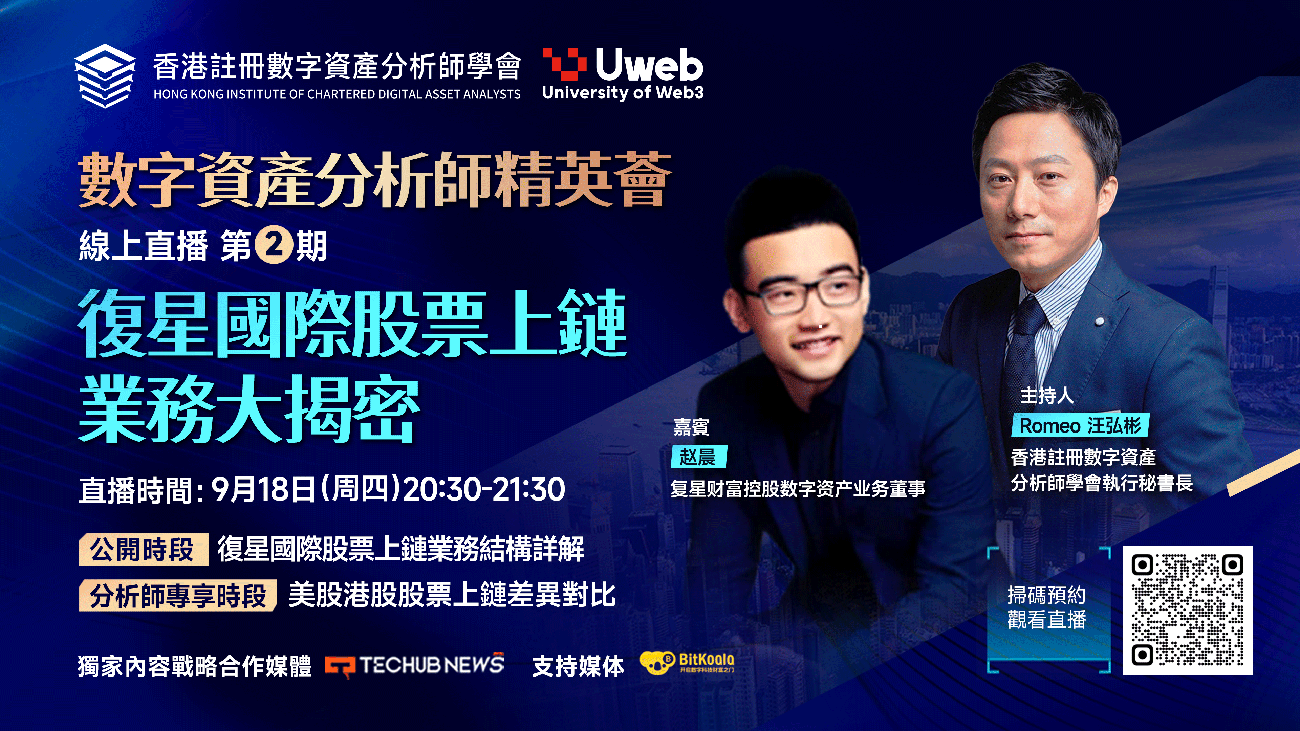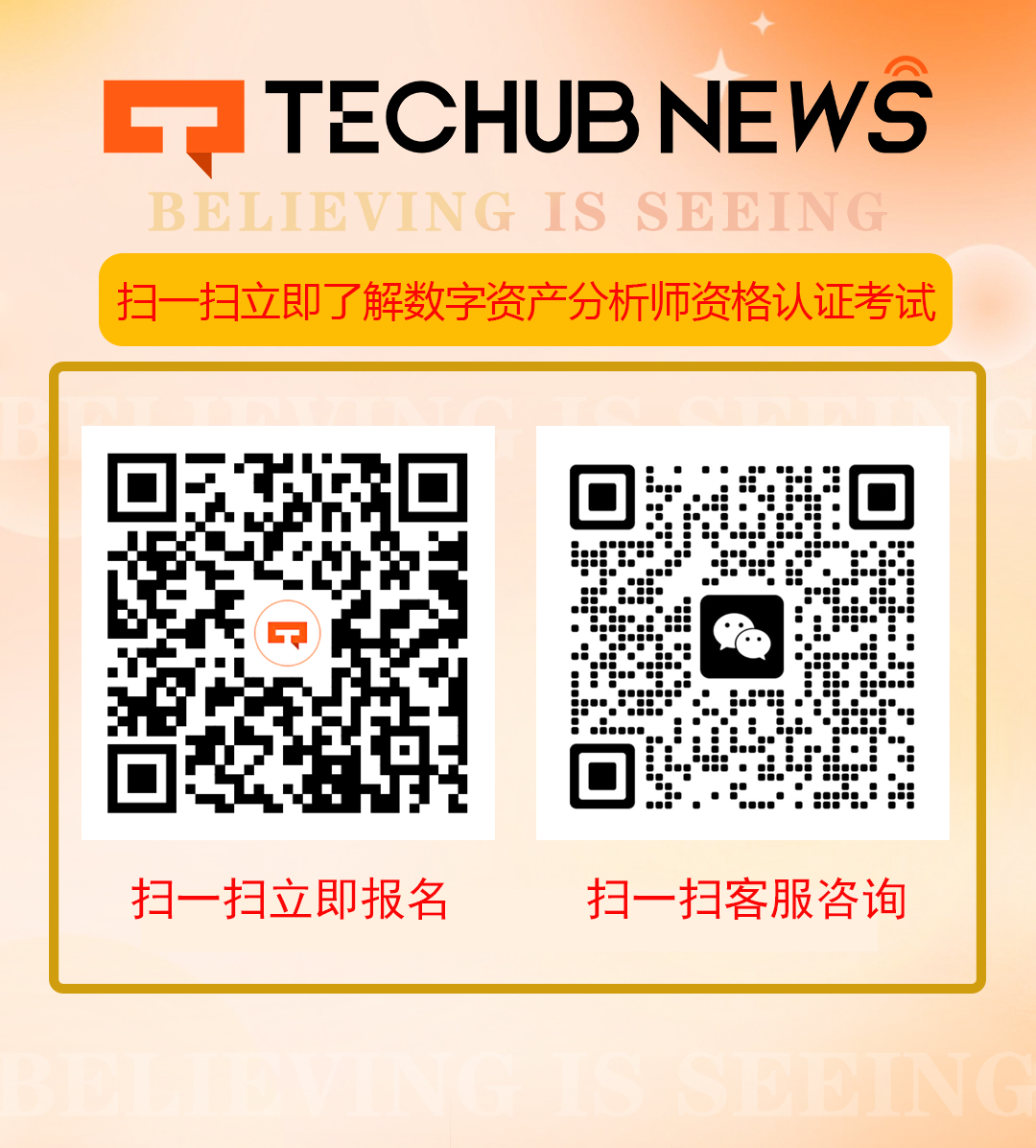Techub News Exclusive Report On September 18, 2024, the "Digital Asset Analyst Elite Online Live Broadcast" Phase 2, co-hosted by the Hong Kong Registered Digital Asset Analysts Association and Uweb, successfully launched. Zhao Chen, Director of Digital Asset Business at Fosun Wealth Holdings, was the core guest, providing an in-depth revelation of the underlying architecture and operational details of Fosun International's stock on-chain business, and comparing the core differences between US and Hong Kong stock on-chain, offering valuable first-hand experience to the market.

Fosun Stock On-Chain: Dual Choices of Standardized Path and Multi-Chain Layout
As the issuer of Asia's first Hong Kong stock-linked RWA project, Zhao Chen systematically dismantled Fosun's business layout logic for the first time during the live broadcast. He revealed that Fosun's digital asset business did not happen overnight; it started with an investment in distributed technology in 2016, went through financial investment accumulation, and only officially upgraded to a core business line of the group after obtaining a Hong Kong license in 2024. Currently, relying on the licensed broker Fosun International Securities, it has formed three major business pillars: Crypto trading, asset management products, and RWA issuance.
In the highly watched RWA business segment, Fosun clearly positions standardized financial products as the core focus. "The most fundamental difference between standardized and non-standardized products lies in whether they have been securitized," Zhao Chen emphasized. Securitized assets have advantages such as clear cash flow, strong compliance, and comprehensive information disclosure, making them more suitable for tokenization; while non-standard assets like real estate and IP have not yet formed a closed-loop business logic and do not currently meet the conditions for large-scale implementation. The standardized assets that Fosun is currently focusing on include money market funds, short-term corporate notes, US Treasury bonds, and stocks, with money market funds being a necessity on-chain, while stocks are part of a forward-looking layout.
In terms of technical architecture, Fosun's choice of a parallel design with four public chains has attracted market attention. Zhao Chen explained that this layout stems from a profound understanding of the essence of public chain TVL: "True TVL should be hard assets recognized by all public chains, just like a country's foreign exchange reserves, and RWA is the only carrier that can meet this requirement." A multi-chain layout not only maximizes asset liquidity but also leverages deep cooperation with public chains to gain liquidity support, covering a broader user base.
When discussing the motivation behind the on-chain stock of Furuya Medical, Zhao Chen candidly stated, "The logic of avoiding harm outweighs the consideration of seeking benefits." He warned the industry that there is currently operational space for "holding stocks to achieve tokenization," and if listed companies do not actively layout, third-party issued on-chain tokens may gain pricing power due to liquidity advantages, ultimately forming a passive situation of "crows occupying magpie nests." Choosing Furuya Medical, which is structured in Israel, as a pilot project is precisely because of its regulatory compliance in accounting and corporate governance.
Cross-Market Comparison: Four Core Differences Between US and Hong Kong Stock On-Chain
In the analyst-exclusive segment, Zhao Chen provided a professional breakdown of the differences between US and Hong Kong stock on-chain, offering a reference framework for cross-market operations.
Regulatory and Compliance Framework: Significant Differences in Flexibility
The US stock market, benefiting from FASB accounting standard reforms, is more convenient for the accounting and tokenization of Crypto assets, and jurisdictions like Switzerland and the Cayman Islands can provide institutional support for the issuance of bearer shares, creating conditions for platforms like by finance to build offshore structures. In contrast, the Hong Kong market is more stringent in its requirements for asset custody and registered circulation due to differences in accounting standards; currently, only Ethereum can quickly pass the tokenization approval for unit trust-type assets, while other public chains must undergo lengthy review processes.
Zhao Chen specifically pointed out that Hong Kong companies with A+H share structures are currently not eligible for tokenization due to guidance from the mainland securities regulatory authority; only Hong Kong stocks with offshore structures and globalized businesses (such as Pop Mart and other well-recognized core assets) are suitable for on-chain advancement.
Investor Rights: Multiple Challenges at the Operational Level
US tokenized products (such as Robinhood's related services) generally do not provide voting rights or dividend rights, essentially resembling CFDs (Contracts for Difference); while Hong Kong stock on-chain theoretically allows for rights penetration, practical obstacles abound: dividends need to adopt a Rebase token model, but current exchanges and custodians lack sufficient support for such tokens; voting rights, due to the need for shareholder identity verification, cannot currently be realized through on-chain mechanisms.
"Currently, the trading value of on-chain stocks still exceeds their investment attributes," Zhao Chen stated, noting that to ensure liquidity, compromises must be made in the realization of rights in the short term, but in the long run, regulators will inevitably gradually improve relevant rules.
Asset Selection and Market Acceptance: The Divide Between Localization and Globalization
US tokenization focuses on globally recognized tech stocks like Apple and Nvidia, leveraging the vast user base of platforms like Robinhood, resulting in high market acceptance; Hong Kong, on the other hand, emphasizes localized core assets, prioritizing targets with minimal cognitive differences between China and foreign markets and high brand recognition. Zhao Chen emphasized that Hong Kong stock on-chain must balance asset maturity and market acceptance; companies with overly localized business models (such as those relying on government tenders) struggle to form cross-market appeal and are unsuitable as on-chain targets.
Operational Threshold: The Gap Between Mature Paradigms and Exploratory Stages
The US has formed a relatively mature operational paradigm, such as reducing KYC requirements through ELN (Equity-Linked Notes) models and achieving efficient settlement relying on the DTCC clearing system; while Hong Kong is still in the exploratory stage of standardized processes, currently serviceable targets must meet the three conditions of "offshore structure + globalized business + high recognition," and still require case-by-case breakthroughs in key areas such as asset confirmation and cross-chain circulation.
Industry Outlook: Composite Talent as Core Competitiveness
Zhao Chen repeatedly emphasized during the live broadcast that the development of the digital asset industry relies on composite talents with a "dual vision." "Those who understand the technical logic and user needs of Web3, as well as the compliance framework and business rules of traditional finance, are the talents who can find the 'sweet spot' in the market." He revealed that Fosun is currently focusing on recruiting such talents, aiming to avoid the "compliance blind spots" of Web3 practitioners while also addressing the "technical barriers" faced by traditional finance professionals.
From an industry trend perspective, the "tightening then loosening" of Hong Kong regulation contrasts sharply with the "moderate loosening" of the US stock market, but both recognize the value of RWA as core assets on-chain. Fosun's practice shows that stock on-chain is not merely a simple technical migration, but a systematic project involving regulation, assets, technology, and markets. Only by basing on standardization, ensuring compliance, and targeting liquidity can sustainable development be achieved.
Currently, Fosun's stock on-chain project has completed issuance, and the initial subscription phase will soon begin. Techub News will continue to monitor the project's progress and market feedback.
Introduction to the Digital Asset Analyst (HKCDAA) Qualification Certification Exam
The Digital Asset Analyst (HKCDAA) qualification certification exam launched by the Hong Kong Registered Digital Asset Analysts Association aims to provide authoritative certification for professionals in the digital asset field. The exam covers areas such as basic theories of digital assets, blockchain technology, investment analysis, trading tools, risk management, regulatory laws and regulations, and professional ethics, cultivating and certifying professionals with a global perspective in digital assets.
The exam has now been officially incorporated into the professional/vocational examination system recognized by the Hong Kong Examinations and Assessment Authority (listed on the Authority's official website) and is administered by the Hong Kong Examinations and Assessment Authority, alongside internationally recognized exams such as HKDSE, CFA, and FRM, under a unified management system. This marks the exam's official authoritative recognition by the Hong Kong Examination Authority, establishing its irreplaceable authoritative position in the digital asset industry and laying the foundation for the standardization and professionalization of talent in the digital asset field, which will inject more reliable professional strength into the Web3.0 industry.
The career development path after obtaining the certification is broad, including directions such as financial institutions and investment companies, digital asset exchanges and Web3.0 enterprises, regulatory agencies and compliance departments, digital asset investment and wealth management, and educational and research institutions. The applicable audience includes practitioners in financial institutions, digital asset practitioners, digital asset investors, regulatory agencies and compliance personnel, as well as students and beginners.
The fourth phase registration discount is here, with a fee of 9,000 HKD, and the registration fee is waived (a reduction of 300 HKD). Those who complete registration by September 12 will also receive a "High-Frequency Key Point Online Course" (valued at 15,000 HKD). Registration is open until September 30, 2025, with the exam date set for December 20, 2025.

免责声明:本文章仅代表作者个人观点,不代表本平台的立场和观点。本文章仅供信息分享,不构成对任何人的任何投资建议。用户与作者之间的任何争议,与本平台无关。如网页中刊载的文章或图片涉及侵权,请提供相关的权利证明和身份证明发送邮件到support@aicoin.com,本平台相关工作人员将会进行核查。




